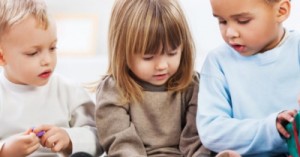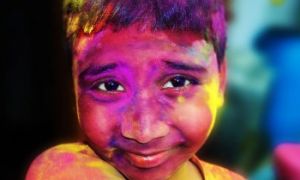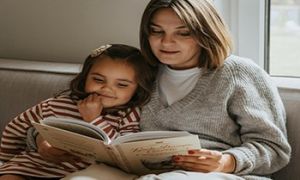Respect for Diversity is one of the main principles that underpin the Belonging, Becoming and Being: Early Years Learning Framework for Australia. Thus it is mandatory for services and educators to use practice that incorporates diverse cultures, especially in monocultural classrooms where opportunities for practice diversity can appear limited. Here are some examples of ways diverse cultures can be embedded in everyday practice.
- Use enrolment forms and orientation meetings to know your learners and their families better At first glance even if your classroom appears largely monocultural, if you start getting to know more about your learners and families, you might find many of them tracing their origins to different parts of the world or using languages other than English at home. The information thus gathered can be used to inform practices like greeting children and families in home languages or identified as relevant to the community.
- Learn key words like “Please”, “thank you”, “hello”, and “goodbye” in languages significant to the child as well as in Sign Language. Use them every day in interactions with children and families.
- Encouraging family members of diverse backgrounds to volunteer for music, dance or art and craft classes so that learners can share their culture.
- Use educators’ experiences to inform practice. Services that have multicultural staff are ideally placed to enrich their learners’ lives with a wealth of diverse perspectives. Share your own experiences of growing up in different cultures and invite other educators and other staff to do the same with children. For example during storytime, including narratives, songs and rhymes from your own culture, creation mythologies from other continents or dreaming stories from Aboriginal and Torres Strait Islander communities.
- Research interesting traditional games from different parts of the world or variations of popular children’s games and incorporate them in your practice. For example, almost all cultures have some form of clapping game played in pairs or a version of tag using an object like a handkerchief.
- Among the most enjoyable ways to embed diversity into everyday practice has to be with food! So for instance a different type of bread from around the world might be included with children’s meals every day like damper, pita bread, roti, nan, Lebanese bread, French stick, bagel, focaccia, baguette or tortilla. Again find ways to explore desserts from around the world which could range from kulfis and coconut puddings to halwa and ice creams. Such culinary discoveries could also be made part of Culture Days or celebrations of festivals in different cultures.
- Ensure your teaching resources are representative of diverse backgrounds and abilities. Children should have access to all colours when drawing or colouring people; keep dolls, toys, and figures of all skin colours like black, brown, ivory, and yellow as well as those with mobility and other aids. Check walls and picture books in the classroom to see if they show a balanced view of contemporary Australians of diverse skin colours, ethnic features, occupations and capabilities.
- Invite representatives from diverse cultural and linguistic groups to deliver talks at your school or host “culture workshops” so that children get to learn about different cultures through interesting activities like arts, storytelling, crafts, cooking, music and movement.
When working with young children, it’s important to create an understanding that all families have their own traditions, beliefs and cultures and we should treat each other with respect and dignity, regardless of where we come from or what we believe.
Celebrating Multiculturalism In Childcare
Cultural competency is about having awareness, respect and understanding of the diversity around you. Cultural competence is “respecting multiple ways of knowing, seeing and living, celebrating the benefits of diversity and having an ability to understand and honour differences".
When we are being culturally competent we appreciate and live with difference, and we are aware of what we gain from acknowledging differences.
Cultural Competence In Early Childhood Settings
As educators, we need to incorporate cultural celebrations within the setting in a sensitive and respectful manner by avoiding cultural tokenism - which is the act of making a small minimal effort towards something.
Avoiding Cultural Tokenism
Many different people from different backgrounds, religions, beliefs and traditions make up Australia. We offer such diversity and provide such a multicultural society that it’s part of the unique qualities of Australia. Those who have come from near and far call Australia their home and it’s our social acceptance and Harmony that make Australia a better place.
Reference:
Introducing Culture Diversity In The MonoCultural Classroom, Diversity Kids
Educators Guide To The EYLF, ACECQA







 As an Educator in Australia, your pay rate falls under the Children’s Services Award 2010. This award states the minimum amount that an employer can
As an Educator in Australia, your pay rate falls under the Children’s Services Award 2010. This award states the minimum amount that an employer can When working as a qualified Early Childhood Teacher (with a university degree) within a service, your rate of pay will come from the Educational Services
When working as a qualified Early Childhood Teacher (with a university degree) within a service, your rate of pay will come from the Educational Services When working as a Diploma Qualified Educator your pay rate is from the Children's Services Award 2010. This Award states your minimum rate of pay
When working as a Diploma Qualified Educator your pay rate is from the Children's Services Award 2010. This Award states your minimum rate of pay When working as a Cert 3 Qualified Educator, your pay rate is from the Children's Services Award 2010. This Award states your minimum rate of
When working as a Cert 3 Qualified Educator, your pay rate is from the Children's Services Award 2010. This Award states your minimum rate of Educational Leaders play a crucial role in their early childhood service by ensuring that the educational program aligns with best practices and supports the holistic
Educational Leaders play a crucial role in their early childhood service by ensuring that the educational program aligns with best practices and supports the holistic In early childhood education and care, ratios are more than a technicality—they are a frontline safeguard. Every child deserves responsive supervision, emotional connection, and developmental
In early childhood education and care, ratios are more than a technicality—they are a frontline safeguard. Every child deserves responsive supervision, emotional connection, and developmental With the new national child safety reforms kicking in on 1 September 2025, early childhood services like yours have a real opportunity to lead the
With the new national child safety reforms kicking in on 1 September 2025, early childhood services like yours have a real opportunity to lead the Here’s a comprehensive Mobile Phone and Smart Watch Policy tailored for early childhood education and care (ECEC) services in Australia, aligned with the latest 2025
Here’s a comprehensive Mobile Phone and Smart Watch Policy tailored for early childhood education and care (ECEC) services in Australia, aligned with the latest 2025 The Sea of Fish Challenge is a national initiative that invites children, educators, families, and communities to create and display fish artworks as a symbol
The Sea of Fish Challenge is a national initiative that invites children, educators, families, and communities to create and display fish artworks as a symbol Across the early childhood education and care sector, educators are sounding the alarm: current staffing ratios are insufficient to deliver safe, meaningful, and developmentally appropriate
Across the early childhood education and care sector, educators are sounding the alarm: current staffing ratios are insufficient to deliver safe, meaningful, and developmentally appropriate


